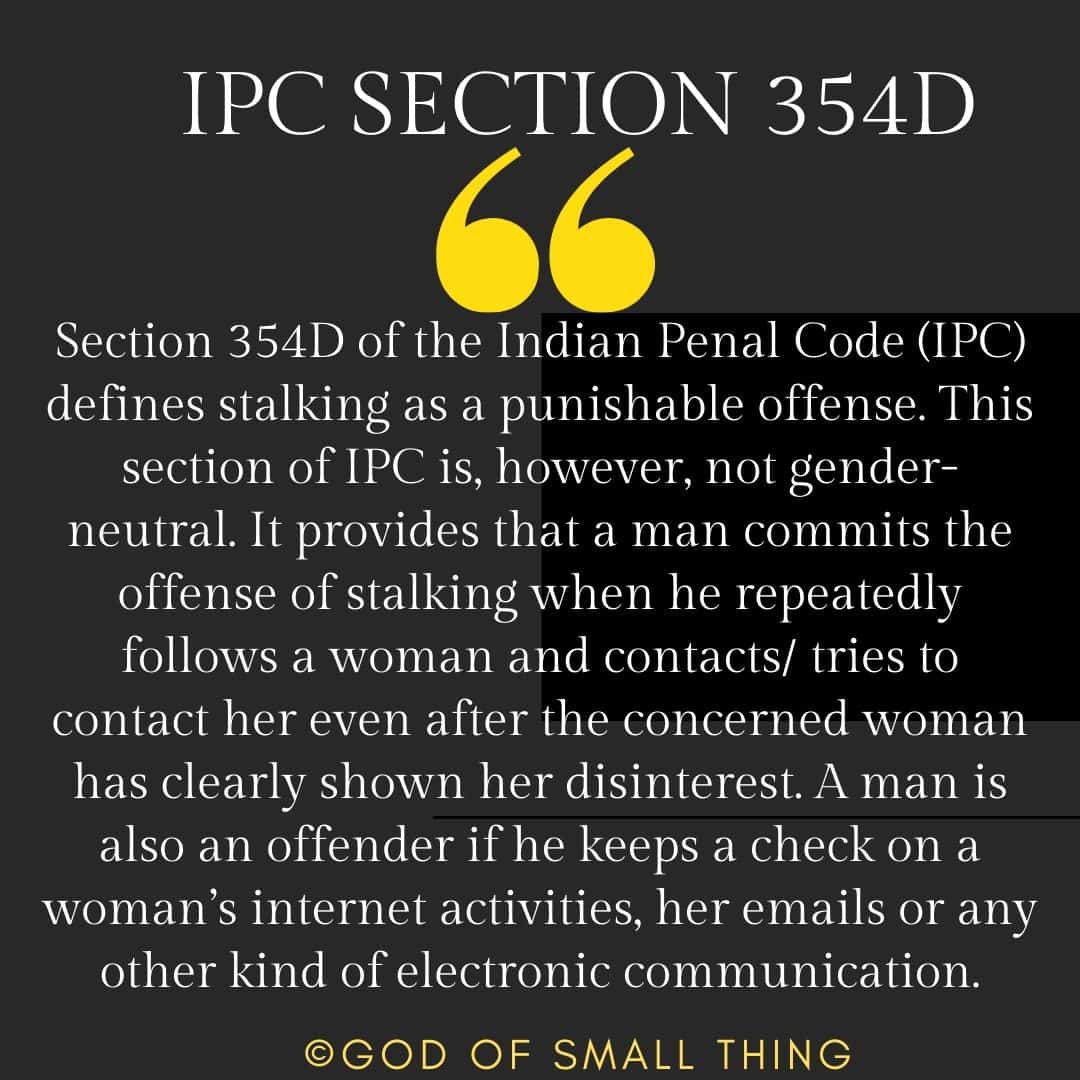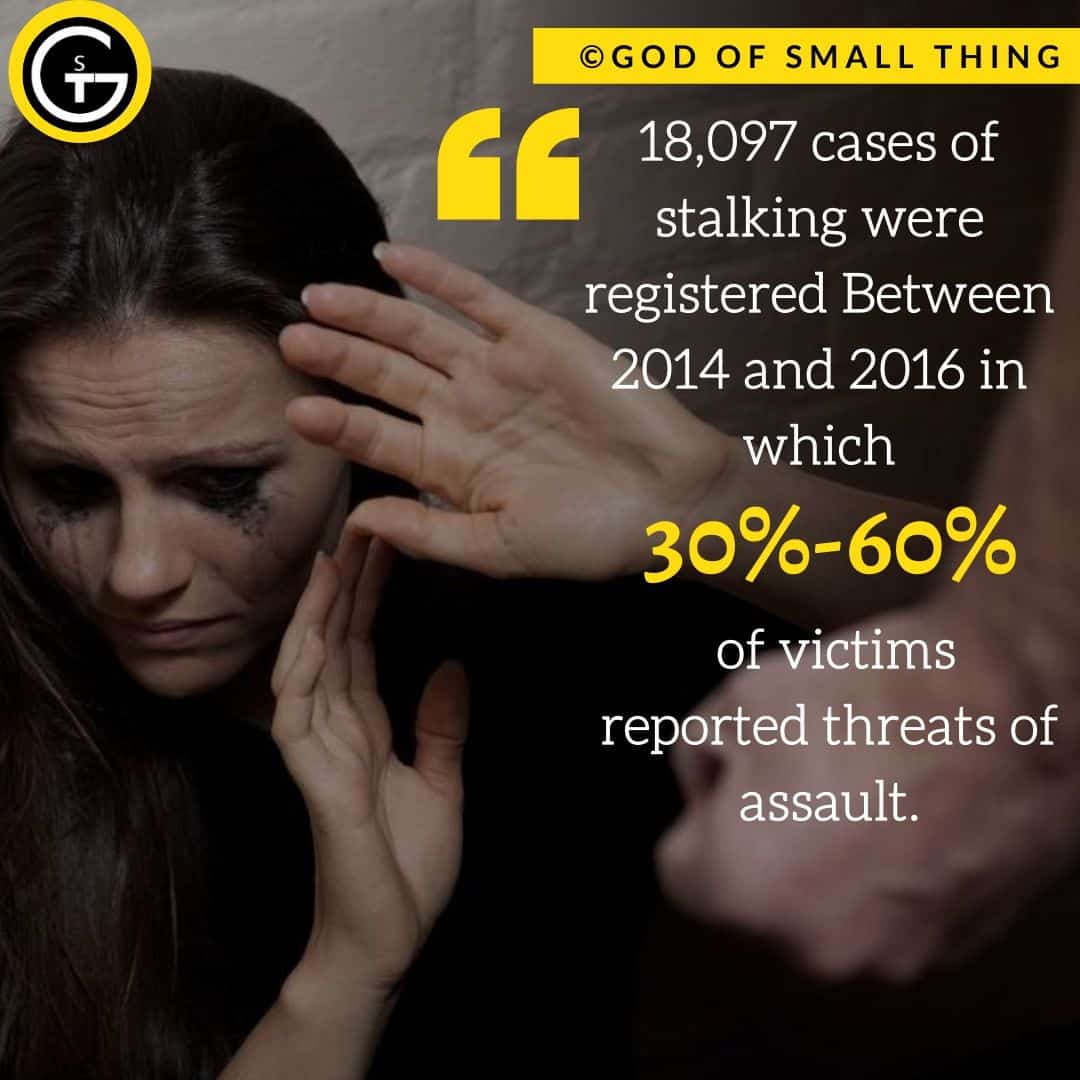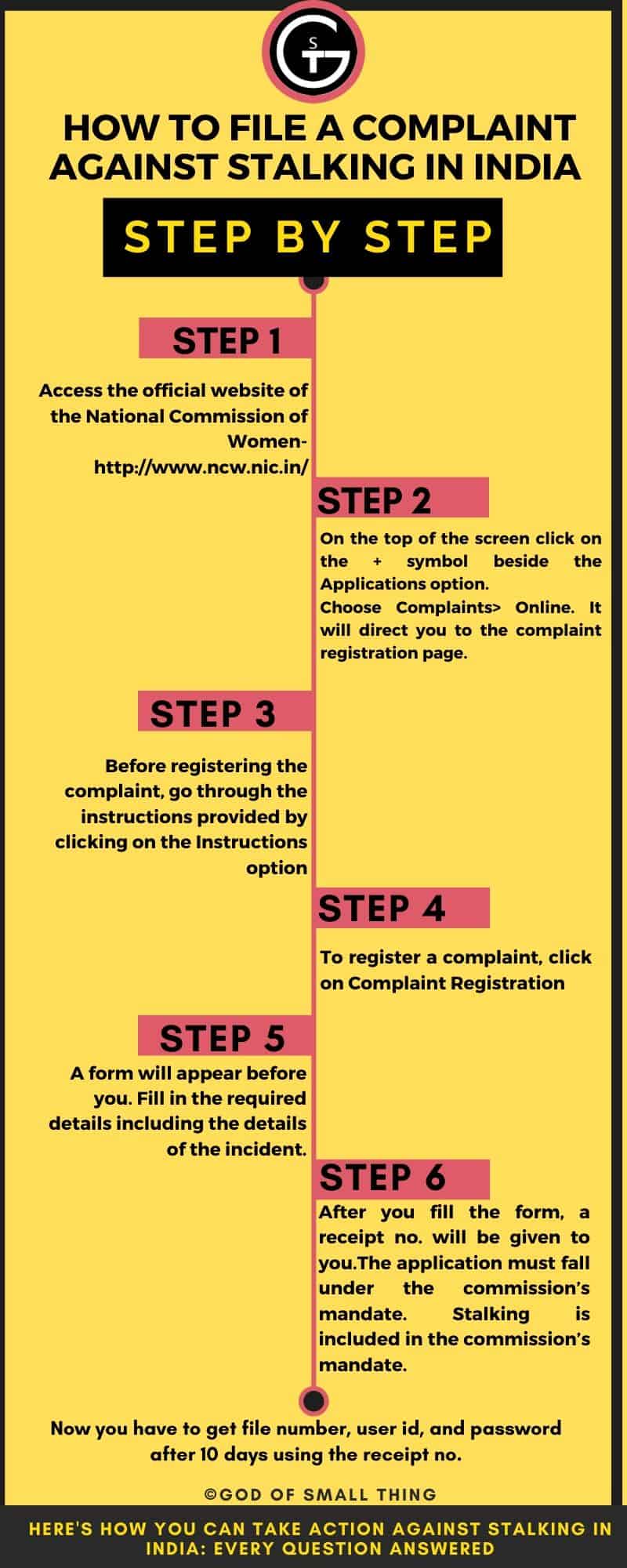Here’s How You Can Take Action against Stalking in India: Every Question Answered
Is someone following you? Have you been stalked in public or on social media? Stalking is a crime and should not be tolerated by anyone. It is not normal being stalked by someone. Stalking laws may not be gender-neutral in India but anyone can be a victim of stalking. Further in the article, we will dive deep into understanding stalking and what can we do. We will discuss how the National Commission for Women can help in the article.
Table of Contents
Table of contents
- Stalking Definition
- What is the crime of stalking?
- Stalking facts in India
- Cyber stalking laws in India
- How to file a complaint against Stalking online step by step with links of where to register
- What is meant by stalked my account?
- What is the definition of aggravated stalking?
- What is meant by stalking in the second degree?
- Is stalking someone on Instagram illegal?
- What is a felony stalking charge?
- How serious is a stalking charge?
- What is first-degree stalking?
- What is the definition of aggravated stalking?
- Is stalking someone illegal?
Stalking Definition
Stalking includes repetitive behaviors towards someone who perceives them as unwelcome. It is a crime that usually involves following or spying somebody illegally- physically or via electronic media, in such a way that causes her/him physical or mental harm, fear, and distress.

There is, however, no universal definition of stalking. A paper published in the Indian Journal of Social Psychiatry does recognize two elements of stalking. One of them is the repetitive nature of the perpetrator’s conduct. The other one is the harm that such an act might cause to the victim. The conduct and harm can both be done in several ways.
The perpetrator may follow, watch, call or message the victim. He/she may enter the victim’s premises, cause damage to property or threaten the victim/ victim’s closed ones explicitly or implicitly. There can also be threats or actions causing public humiliation or harm to the victim’s reputation. The conduct of the perpetrator can cause interference in the victim’s personal life or work life as well. Not only this but also the perpetrator may reach to the extent of causing physical or sexual assault to the victim.
On the contrary, the victim usually feels that s/he is being watched and therefore may experience anxiety. The victim may experience disturbed sleep patterns, social withdrawal and changed social behavior. There are several ways that the victim may try to cope with distress. They include:
- Seeking help from family and friends
- Ignoring the stalker
- Moving to a new place
- Changing phone number and social media accounts
- Reasoning with the stalker
- Counter-threatening or confronting the stalker
- Filing a formal complaint, etc.
What is the crime of stalking?
IPC Section 354D

Section 354D of the Indian Penal Code (IPC) defines stalking as a punishable offense. This section of IPC is, however, not gender-neutral. It provides that a man commits the offense of stalking when he repeatedly follows a woman and contacts/ tries to contact her even after the concerned woman has clearly shown her disinterest. A man is also an offender if he keeps a check on a woman’s internet activities, her emails or any other kind of electronic communication. There are, however, exceptions to this.
The act of a man does not amount to staking if he successfully proves that he committed such an act for the following reasons:
- the State had given the man the responsibility to prevent or to detect a crime
- he did such an act in compliance with the law
- commission of such an act was reasonable and justified in that specific circumstance
Section 354D punishes any man who is guilty of stalking with imprisonment extending up to 3 years along with fine. If the same man commits the offense of stalking for a subsequent time, he shall be punished with imprisonment extending up to 5 years along with fine.
While section 354D specifically punishes for the crime of stalking, few other laws can be applied in cases of stalking.
IPC Section 507
Section 507 of IPC penalizes the act of criminal intimidation by anonymous communication.
- A person threatens another person anonymously.
- The threat is about causing injury to the other person, their property or reputation.
- Threat is about causing above mentioned injuries to the victim’s loved ones.
- The threat is accompanied by an intention to cause harm.
- The victim is alarmed or is asked to do or not do something illegal to escape the execution of the threat.

Let us take a look at an example. A threatens B asking B to not file a complaint against A or say, A demands sexual favors from B. And that if B does not comply, A will release the unsolicited pictures that A had accessed while stalking B over the internet.
Similarly, Section 509 of IPC penalizes any person who uses words, gestures or actions to insult a women’s modesty. The punishment for this offense is imprisonment extending up to one year along with fine. Section 67A of the IT Act is another such law. We shall talk about it later in the article.
Stalking facts in India
Stalking is a very common practice in India. It has however been normalized to a dangerous extent. We try to justify such actions by saying things like “boys will be boys” or “how can a boy be stalked” and so on. Incidents of stalking may begin from surveillance. But they most often take horrific forms like assault, murders, and rapes. Let us look at some facts related to stalking in our country:

- Stalking is a newly recognized offense in our country. It was only in 2013 that criminal law was amended in this regard.
- Between 2014 and 2016, 18,097 cases of stalking were registered. In these cases, 20,743 arrests were made. However, the number of convicts stood at 1,216.
- In the above-mentioned cases, 30%-60% of victims reported threats of assault.
- There have been cases where stalking took extreme forms. A man shot a woman dead when she turned down a marriage proposal. Another stalker stabbed a woman to death after she complained to the police about being stalked.
- Section 326 of IPC deals with acid attacks. In several cases of acid attacks in our country, the perpetrator had been someone who had previously stalked the victim.
- The Times of India has mentioned in an article that around 80% of the time, the stalker is someone the victim knows.
- Mullen talked about various types of stalkers depending upon the motive with which they stalk the victim. A rejected stalker generally pursues the victim for reconciliation or revenge. It can be a former partner as well. Intimacy- seeking stalkers are the ones who think that they have a very close relationship with the victim. Often, they believe it to be ‘true love’, more specifically considered as erotomaniac delusions. Incompetent stalkers are those who are well aware of the victim’s disinterest. Yet they pursue the victim in the hope of the desired relationship. Resentful stalkers believe that the victim wrongly aggrieved them. Hence, they intend to frighten the victim. Predatory stalker prepares for sexual assault. This has been associated with the condition of paraphilia.
- In India, there is so specific classification of stalking laws as first and second degrees, aggravated stalking or a felony charge. We shall know about them later in the article.
Cyber stalking laws in India
We live in a world where the Internet opens up the doors not only to worldwide connectivity but also to several cybercrimes. Cyberstalking is an act of harassing a person through the use of the internet. It has also been understood as a ‘repeated pursuit of a person over the internet’. It may include-

- Repeatedly sending messages to the other person in pursuit of the desired relationship with her/him even after being turned down by the victim
- Making obscene comments or sending unsolicited graphic content repeatedly
- Accessing the victim’s emails and other data through spyware and then using it to harass the victim
Cyber stalking is different from physical stalking in many ways.
- The victim may not be aware that s/he is under surveillance.
- The perpetrator’s location may be unknown to the victim. Hence, it would be difficult to ascertain whether the perpetrator is in physical proximity to the victim or not.
- Until any interference from professionals, the perpetrator might successfully maintain anonymity.
The offense of cyberstalking is majorly dealt with under Section 354D of IPC as discussed above. Apart from that, the Information Technology Act, 2000 also deals with the same. As per the Section 67A of the act, any person who electronically publishes or transmits sexually explicit content commits an offense. Such a person shall be punished with imprisonment for up to 5 years. For a subsequent offense, the person shall be punished with imprisonment for up to 7 years. In both these cases, there is fine extending up to 10 lakh rupees
How to file a complaint against Stalking online step by step with links of where to register
The National Commission for Women is a statutory body that deals with government policies and laws concerning women. The National Commission for Women has a complaint and investigation cell that processes the complaints received through the official website. You can file a complaint online via the main website of The National Commission for Women, orally or in writing. To register a complaint online, you can follow the steps given below:

- Click here to access the official website of the National Commission of Women- http://www.ncw.nic.in/
- On the top of the screen click on the + symbol beside the Applications option
- Choose Complaints> Online. It will direct you to the complaint registration page.
- Before registering the complaint, go through the instructions provided by clicking on the Instructions option or click here http://ncwapps.nic.in/onlinecomplaintsv2/frmInstructions.aspx. Also, if you have any other query, you can click on the FAQs option or click here http://ncwapps.nic.in/onlinecomplaintsv2/frmFAQs.aspx
- To register a complaint, click on Complaint Registration or click here http://ncwapps.nic.in/onlinecomplaintsv2/frmPubRegistration.aspx
- A form will appear before you. Fill in the required details including the details of the incident.
- After you fill the form, a receipt no. will be given to you.
- The application must fall under the commission’s mandate. Stalking is included in the commission’s mandate.
- Now you have to get file number, user id, and password after 10 days using the receipt no.
This is how you can complain against stalking at the National Commission for Women’s website easily.
Do you know? There are 15 types of Girl Personalities according to their traits!! Which one are you?- Types of Girl Personalities
What is meant by stalked my account?
It means that a stalker may follow you through the internet. This includes the following behaviors:
- Monitoring your activities on social media
- Messaging you despite your clear disinterest
- Sending undesirable messages or media
- Accessing your emails or private data by means of spyware
- Using the data collected to contact and harass you or your closed ones
Here again, we must keep in mind the repetitiveness of such behavior and the distress caused.
What is the definition of aggravated stalking?
A person commits aggravated stalking when s/he cyber stalks;
- A child under the age of 16
- Any person whom s/he is not allowed to contact. For example, an ex-girlfriend that the person had abused in the past. And consequently, the courts forbade the person to contact her.
What is meant by stalking in the second degree?
Stalking in a second degree means that the perpetrator intended to cause and caused fear of physical safety in the victim’s mind. The perpetrator causes such fear by repeatedly following, watching or waiting for the victim. One major requirement for stalking to be a first-degree offense is the offender’s intention. Indian laws, however, do not explicitly classify the degrees of stalking offenses.
A woman can do everything in this world and women in the country are prooving the quote very much true. One such inspirational story is of Poonam Dalal. A 9 Month Pregnant Women who Cleared UPSC Exam. An Inspiration for All UPSC aspirants
Is stalking someone on Instagram illegal?
We have previously discussed how someone stalks you on social media. Stalking someone on Instagram falls under cyberbullying. It is a crime under IPC Section 354D as a crime against women. Apart from the IPC, various laws like Section 503, 509 and IT Act Section 7A can be applied. The application of these laws depends upon the extent of cyberstalking on Instagram.
What is a felony stalking charge?
Indian laws do not specifically define felony stalking charges. Various countries, however, recognize stalking as a felony when;
- The harassment is targeted at someone based on race, color, religion, sex, sexual orientation, disability or nationality.
- The offense violated the age criteria. For example, in Minnesota, it is a felony when the victim is under 18 years of age or is 36 months older than the perpetrator.
- There is a violation of the Court’s prohibition order.
- The perpetrator is on parole and s/he continues harassing the victim during that time.
How serious is a stalking charge?
Section 354D IPC mentions the punishment for the crime of stalking. The punishment includes imprisonment that may extend up to 3 years. If the person commits a subsequent offense, the court shall punish him with imprisonment exceeding up to 5 years. In both these cases, imprisonment is accompanied by a certain amount of fine. Also, the first offense of stalking is bailable while subsequent offenses are not.
What is first-degree stalking?
First-degree stalking refers to the commission of a second-degree stalking offense by a person:
- After having been convicted for stalking previously (A similar condition is mentioned in Section 354D IPC although not defined as sec)
- In violation of a court order
- The victim is under a certain age, for example, 16 years in Vermont
What is the definition of aggravated stalking?
A person commits aggravated stalking when s/he cyber stalks;
- A child under the age of 16 (e.g. Florida)
- Any person whom s/he is not allowed to contact. For example, an ex-girlfriend that the person had abused in the past. And consequently, the courts forbade the person to contact her. (e.g. Florida, Georgia)
Is stalking someone illegal?
Stalking someone is a crime under the IPC Section 354. It is one of the various offenses against women. Both physical stalking and cyberstalking are punishable offenses in India. The punishment of imprisonment can extend to 3 and 5 years depending on if it a first offense or a subsequent one. The National Commission for Women also specifically deals with complaints regarding offenses against women. Click here to visit their website- http://www.ncw.nic.in/
We hope we have covered everything you need to know about stalking and how to file a complaint on the National Commission for Women. We urge women to stay safe and be brave.
Source: National Commission for Women
Looking forward to becoming an Entrepreneur: Here are some Must have characteristics of a successful woman. How many do you have?




Like!! I blog quite often and I genuinely thank you for your information. The article has truly peaked my interest.